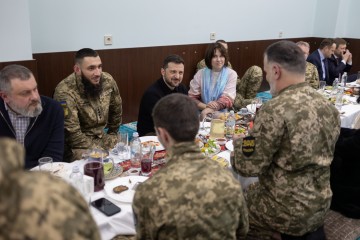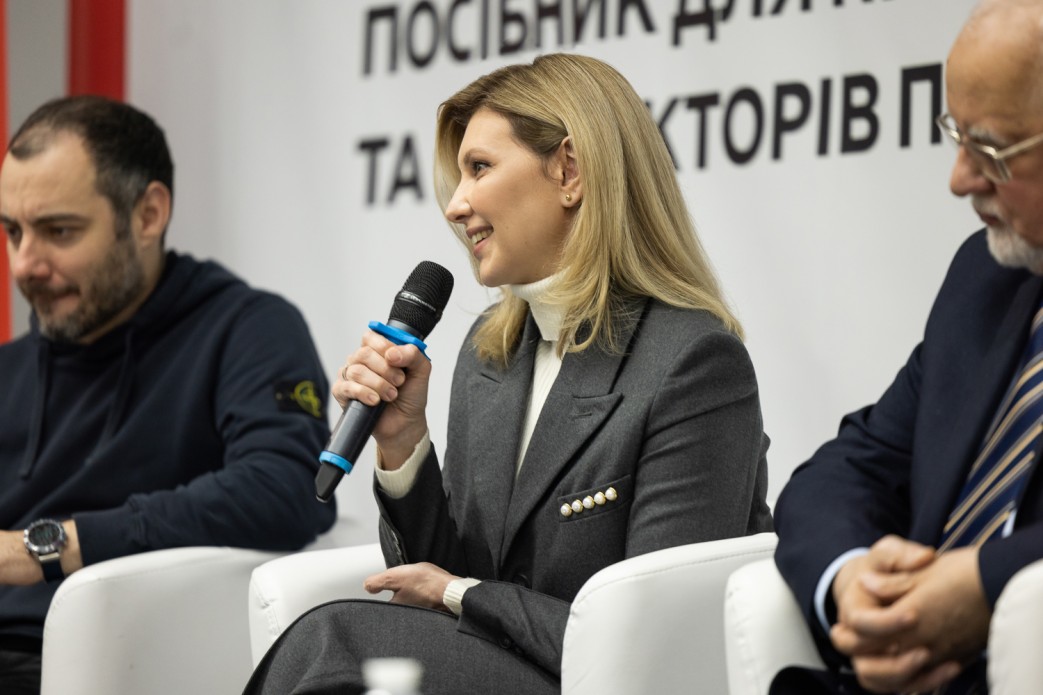First Lady of Ukraine Olena Zelenska took part in a dialogue with architecture students and representatives of the professional community on the future of Ukrainian cities, comfortable and barrier-free for residents, and spoke about the Album of Barrier-Free Solutions.
The dialogue took place online and offline with the participation of Oleksandr Kubrakov, Deputy Prime Minister for Restoration of Ukraine and Minister for Communities, Territories and Infrastructure Development, representatives of professional and expert circles, architectural bureaus, and heads of regional military administrations.

The Album of Barrier-Free Solutions is a practical guide that recommends and demonstrates how the urban environment can be friendly to different users. The developers of the Album, the team of the Big City Lab urban bureau, involved experts in the fields of urban planning, construction, human diversity, and other areas related to the creation of public space.
"Imagine a person in a wheelchair living on the top floor of a regular five-story building. An air alert sounds. In a few minutes, the first explosion is heard. Do you think this person can get to the shelter quickly? People with limited mobility are now at greater risk than others. Even the way to safety is dangerous for them. This war has shown us that a barrier-free environment is not a formality. It is a matter of survival," Olena Zelenska noted.
The President's wife reminded that the first section of the Album (on accessible porches and courtyards) was presented at the end of 2021, and after the full-scale invasion of Russia, it was adapted to wartime conditions. Three new sections of the manual dedicated to street infrastructure, public space and public buildings and structures also take into account new realities.

For example, they describe what to look for when designing shelters and what vulnerable groups should be taken into account, what types of glass are safer than others, and how to plan the entrance to a temporary hospital building. There are also recommendations for pedestrian-safe roadblocks and anti-tank hedgehogs, light camouflage of streets, and installation of emergency aid stands with defibrillators. It emphasizes the importance of sensory relief rooms for those who are sensitive to light and sound, accessible showers and places to eat in shelters.
"It's up to architects and builders to create a space around our people - those with prostheses or wheelchairs, those with visual or mental disabilities, the elderly, mothers with children, all of us, because no one really needs obstacles. The war has created many of them already. The principles of barrier-free access should be included in university curricula. And not just specialized ones. Because all of us, regardless of our profession, must see people first and foremost behind all our actions and how we can make their lives easier," Olena Zelenska said.

For his part, Oleksandr Kubrakov emphasized: "The problem of accessibility of urban infrastructure for people with limited mobility is a systemic problem in Ukraine. We are working in three key areas to overcome it. These are the development of barrier-free rules and standards, strengthening control and responsibility for their observance, and raising awareness of the principles of barrier-free accessibility among responsible persons. I am grateful to First Lady Olena Zelenska for her leadership in this process, which allows us to constantly move forward with the issue of creating a barrier-free space despite the war."
"In this terrible war, we are fighting for people, for their decent lives. Therefore, barrier-free access is about human-centeredness, security and life itself," the First Lady added.
All sections of the Album of Barrier-Free Solutions are available for download here.
The Album of Barrier-Free Solutions was created as part of the "Without Barriers" initiative of First Lady Olena Zelenska . The project was implemented by Bezbaryernist NGO in cooperation with the Ministry for Communities, Territories and Infrastructure Development of Ukraine as part of the "Integrated Urban Development in Ukraine II" project, which is implemented by the German government company Deutsche Gesellschaft für Internationale Zusammenarbeit (GIZ) GmbH and funded by the governments of Germany and Switzerland. The developer of the Album of Barrier-Free Solutions is the Big City Lab urban bureau.





